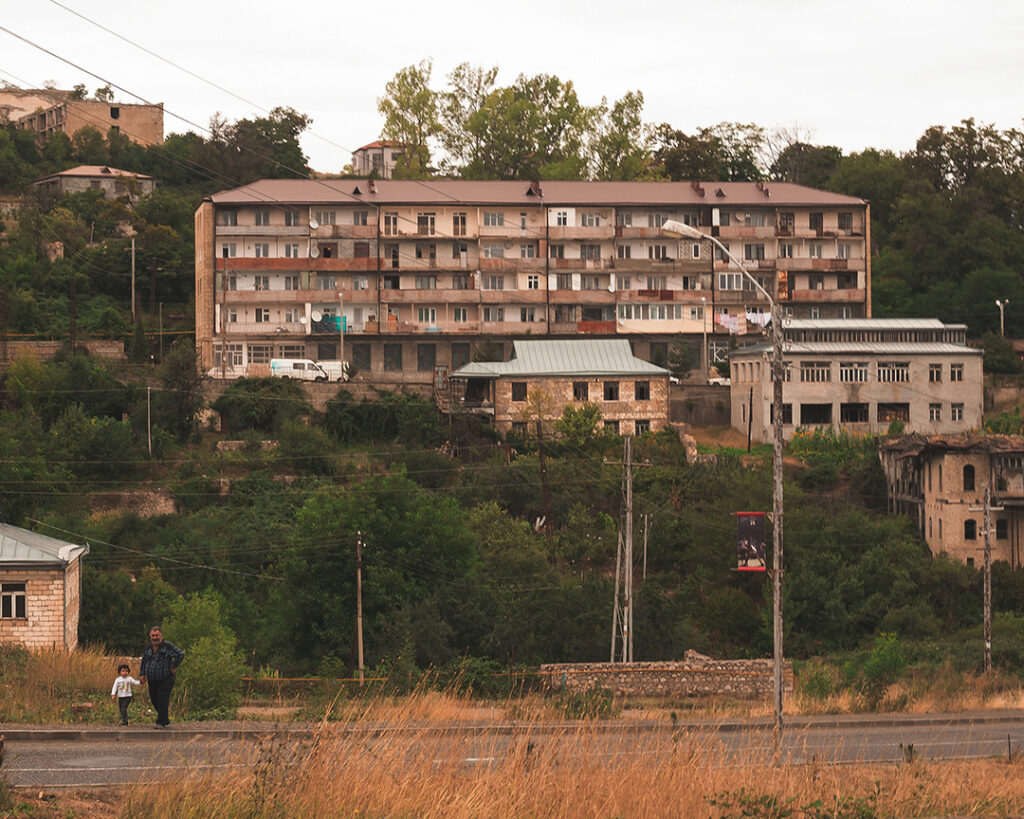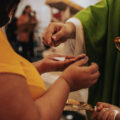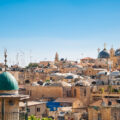Faith and friction: The role of religious identity in the Nagorno-Karabakh conflict
Faith and friction: The role of religious identity in the Nagorno-Karabakh conflict
Is the Nagorno-Karabakh conflict about religion? Unravel the different layers of tension: ethnicity, history, and religious identity.
Nagorno-Karabakh: a religious conflict?
Between 19 and 20 September 2023, the Azerbaijani army invaded Nagorno-Karabakh, an enclave in Azerbaijan populated by ethnic Armenians. The military offensive sprung from decades of armed conflict and ethnic tensions. Following the invasion, large groups of Armenians have fled the area out of fear of ethnic cleansings and oppression.[1]
Nagorno-Karabakh is inhabited by ethnic Armenians but enclosed within territory allocated to Azerbaijan. As a result, it is subject to various tensions. For one, the region encounters tensions between different ethnic identities. Apart from this, tensions arise on account of religious divisions. Whereas the Azerbaijani population is largely Muslim, the ethnic Armenian population of Nagorno-Karabakh is predominantly Christian.[2]
Armenian Christians persecuted?
Some people believe that the Nagorno-Karabakh conflict is deeply intertwined with the issue of religious identity. Armenia is a country with a rich Christian history, and it shares borders with Muslim-majority nations like Turkey and Azerbaijan. This is thought to be a source of great tension. Lately, a noteworthy historical event has gained diplomatic attention: the Armenian genocide in the Ottoman Empire during World War I. Based on this tragic historical episode, people argue that the current conflict is also about the persecution of Armenian Christians.[3]
In view of the invasion of Nagorno-Karabakh, many Armenian Christians feel like their Christian identities are under threat.[4] According to Œuvre d’Orient, a French Catholic charity organisation, Azerbaijan is specifically targeting Christians.[5] American politician and defender of religious freedom Sam Brownback even speaks of a “religious cleansing” of Nagorno-Karabakh.[6]
However, not everyone believes that the conflict at hand has a religious character. Father David, an Armenian priest, points out that Armenia maintains close connections with its neighbouring country Iran, which practises the Shi’ite Islamic faith just like Azerbaijan. He thinks that the recent invasion was driven by a strictly political and ethnic conflict. “This isn’t a war of faiths, or a war against Christianity,” he claims.
Ancient Christian heritage threatened
Armenia is traditionally recognised as the world’s oldest Christian nation, with its conversion to Christianity dating back to 301 AD. The country’s identity is deeply intertwined with Christianity, which is evident through its numerous historic monastery complexes. Being home to hundreds of religious sites, Nagorno-Karabakh also has a rich Christian heritage.[7]
However, the invasion by the Azerbaijani army has instilled fear among Armenians and Christians worldwide regarding the future of the region’s Christian roots.[8] They are concerned about the potential cultural and historical losses that Nagorno-Karabakh might suffer. Some even speak of a total “destruction of Christian heritage.”[9]
A response from Christian Europe
Since the escalation of the Nagorno-Karabakh conflict, Christians from all over Europe have voiced their solidarity with the Armenian population. Pope Francis, acknowledging the gravity of the situation, stressed the urgent need to “find a lasting agreement that puts an end to the humanitarian crisis.” The Armenian Churches of France condemned the attacks, speaking of “a plan of extermination” and “ethnic cleansing.”[10]
Meanwhile, the Armenian Apostolic Church in Sweden has initiated a fundraiser aimed at supporting a sister church in Armenia that is receiving refugees from the affected area. The Austrian Bishops’ Conference also responded to the situation, calling upon believers to join in prayer for peace.[11]
Religious tensions
The Nagorno-Karabakh conflict involves various dimensions, ranging from ethnic and historical to political and territorial. Amid these complexities, many people also consider the role of religious difference. International media often frame the conflict at hand as a religious struggle between Christians and Muslims.[12]
Yet, the precise role of religious identity in the Nagorno-Karabakh conflict remains a subject of debate. Although religious divisions are likely to play a role, it is unclear whether the conflict can be framed as religious. Opinions vary widely, with some asserting that it is strictly ethnic and territorial, while others emphasise the religious dimension of the conflict at hand. In any case, this debate shows how complex the Nagorno-Karabakh conflict is.
Want to learn more about similar topics? Explore the EARS Dashboard
Sources
[1] ‘De massale uittocht is begonnen’: Duizenden Armeense christenen op de vlucht
[2] A religious war? Christianity and Islam as features of international relations in Nagorno-Karabakh
[3] Azerbaijan takes control of Nagorno-Karabakh: “The complete destruction of an ancient Christian culture”
[4] Is the Karabakh conflict about religion, Armenians wonder
[5] Azerbaijan specifically targeting Christians in Nagorno-Karabakh, says Catholic charity
[6] Armenian Christians face ‘religious cleansing,’ say rights activists
[7] Armenian priest fears for Karabakh’s Christian heritage amid mass exodus
[8] European Christians feel solidarity with fleeing Armenians
[9] ‘Our Worst Nightmare’: Nagorno-Karabakh Horror Sends 80,000+ Fleeing, Sparks Warning About Total ‘Destruction of Christian Heritage’
[10] European Christians feel solidarity with fleeing Armenians
[11] European Christians feel solidarity with fleeing Armenians
[12] A religious war? Christianity and Islam as features of international relations in Nagorno-Karabakh






